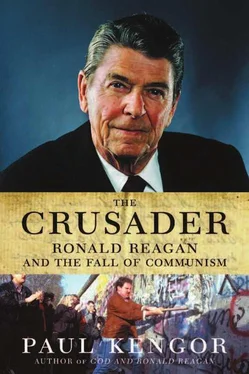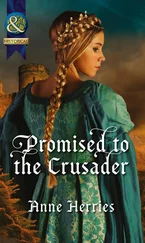14. Interview with Joseph Dudek, Radek Sikorski, March 3, 2003. “This was the only
1. Dobrynin, In Confidence, 632.
2. In the mid-1990s the Heritage Foundation began publishing a popular Index of Economic
Freedom, which measures degrees of economic freedom. Former Communist countries like the
Czech Republic and Estonia ranked as high as eleven, far freer than Western European economies
like France, Italy, and Spain (Gorbachev’s favored model).
3. Brown, The Gorbachev Factor, 306.
4. Ibid., 91, 130, 252, 267.
1. Morris, Dutch, 667.
2. Deaver also makes the point that Reagan himself saw his lifeguarding as a parable of
his larger life. Deaver, A Different Drummer, 14–15.
3. Interview with Olive and Savila Palmer and Marion Emmert Foster, Heritage Square
nursing home, Dixon, Illinois, June 22, 2001.
4. The authoritative Harvard University Press study, The Black Book of Communism, estimates 100 million dead. The book was published prior to the two to three million deaths that
occurred in North Korea in the late 1990s. Also, it uses a figure on the USSR that is conservative
and, judging from recent seminal works on Mao’s China, may have underestimated the death
toll in Red China by ten million. No doubt, at least 100 million were killed under Communism,
and likely many more.
5. Data was provided by Freedom House staff, April 8, 2002.
1. John Lewis Gaddis, “The Long Peace,” International Security, 10, no. 4 (Spring 1986). Reprinted in Sean M. Lynn-Jones and Steven E. Miller, eds., The Cold War and After: Prospects for Peace (Cambridge and London: The MIT Press, 1993), 33.
2. Clark shared this during a February 22, 1999 presentation in Washington, DC. For a transcript, see: Clark in Schweizer, ed., The Fall of the Berlin Wall, 75.
3. Marc Fisher, “The Old Warrior at the Wall,” Washington Post, September 13, 1990, D1–2.
4. Ibid.
5. Lawrence K. Altman, “Reagan’s Twilight—A special report,” New York Times, October 5, 1997.
It is impossible to thank all of those who played a role in this book. Their contribution is partly reflected in the 1,200 endnotes, which comprise over a quarter of the overall text. I’m often asked how many people I interviewed in the course of researching and writing this book over the last roughly ten years. My best estimate is that I’ve done hundreds of interviews.
Those that gave their time were Reagan officials as diverse in their views as George Shultz and Cap Weinberger, both of whom frequently disagreed in the 1980s but, fortunately for me, agreed to talk with me. Weinberger shared his insights several times. He died a week before I handed in the final draft of this manuscript.
I appreciate the time of men as well-known as Lech Walesa (my special thanks to his translater, Tomasz Pompowski) as well as people as little known as Dixonites Marion Emmert Foster, the Palmer sisters, Ron Marlow (Dixon’s best kept secret), and a host of others. The latter individuals reaffirm my continuing advice to Reagan researchers: You can’t know Ronald Reagan without going to Dixon, Illinois.
I spoke to a number of Reagan speechwriters: Ben Elliott, Peter Robinson, Ken Khachigian. I talked to many Reagan friends, from Charlie Wick to the extraordinary Bill Clark, the subject of my next book. Most of those I spoke to gave more than one interview. This is especially true of Clark and is also true of Richard V. Allen, Ed Meese, Richard Pipes, Michael Reagan, and others. I commend Bill and Michael Reagan for their commitment to telling the truth about Ronald Reagan’s commitment to human life, from the gulag to the womb.
I was especially appreciative to Edward Teller. To the best of my knowledge, I was the last person to interview Dr. Teller before he died. As I walked into his modest home in Palo Alto, California on July 15, 2003, and caught my first glance at him sitting horizontally in a reclining chair, I was shocked. This man of such renown and prestige was on his deathbed. I had hoped for fifteen minutes with Teller. After my first question, he paused and murmured: “We have no time.” I told him that was fine and I would go. I asked if he wanted me to get his nurse. He said yes. When I returned, he was ready to talk. We proceeded to talk for almost an hour and a half. He became increasingly alert. Still, he struggled greatly, and his words were often indiscernible.
I felt compelled to ask Teller a question I had not intended: If he didn’t mind, I asked, could he tell me about his spiritual views? Did he believe in God? The situation seemed to beg the question. He told me emphatically: “I strongly believe that I should not talk about things I don’t understand.” The scientist within came rushing forth: Teller said he did not have adequate “information” to make a determination about God’s existence. When I asked again later, when the matter presented itself naturally, he retreated to his earlier position: “You ask me about God, and I will say, ‘I don’t know.’ And if I don’t know, I won’t talk about it.” I smiled and told him I would not try again.
When I insisted (for his sake) that it was indeed time for me to go, he finally relented to let me leave. He bid me farewell by saying simply, “Go write a good book.” He managed to sign a copy of his memoirs for me, without ever getting up or lifting his head. I told him I would return the gesture by sending a signed copy of my book once it was published. As I knew, I would never get the chance: Shortly after I returned to Grove City, Edward Teller died on September 9, 2003 at the age of 95.
I believe I also may have done the final interview with a less-known but likewise significant individual named Gus Weiss, a Reagan NSC staff member whose story was so intriguing that snippets of it—though certainly not the entire story—made the front page of the Washington Post on February 27, 2004.
Other than Ronald Reagan himself, I interviewed every person that I wanted to speak to for this book. All were very cooperative and eager that this story be told. I remember that Professor Fred Greenstein, in his seminal work on Eisenhower, said that he had conversations with associates of all modern presidents since FDR, and that none were more unified than Eisenhower’s in admiration of their leader. I found the same with Reagan’s staff, especially those who knew him since the California days, men like Clark, Meese, and Weinberger.
In regard to research, I’m the only Reagan researcher who had access to the private collection of letters sent by Reagan to Mary Joan Roll-Seiffert, who in the 1940s was the president of the Pittsburgh chapter of Reagan’s Hollywood fan club. I was also told that I was among the first to read the Lorraine Wagner letter collection held by the Young America’s Foundation (YAF). The Wagner-Reagan collection of correspondence is rich, and reaches from the 1940s to the 1990s. Also with the help of YAF, and specifically Floyd Brown and Andrew Coffin, I was given full access to the bookshelves at the Reagan Ranch in the Santa Ynez Mountains of California. I was permitted to spend four hours pulling each book off the shelf and searching it for personal annotations from Reagan. I was able to document not only the types of books that Reagan read but also what he remarked upon and thought about these books as he read them—meaning, I read his marginalia. The subject matter in the books ranges from economic theory to treaty agreements with the USSR to biographies to westerns and cowboy novels.
Likewise, the documents at the Reagan Library were obviously very illuminating. In the summers of 2001, 2003, and 2005, I benefited from the diligence of archivists like Greg Cumming, Cate Sewall, and Ben Pezzillo, as well as Kirby Hanson, Holly Bauer, Duke Blackwood, and other Reagan Library staff—a solid group of people. I read a large number of documents only recently declassified. This book placed its heaviest emphasis on primary sources. All declassified NSDDs were carefully read. I tried to read every speech, letter, or Cold War–related document in the Presidential Handwriting File (PHF) at the Reagan Library. In each case, I ascertained Reagan’s exact input in each. The PHF is a file of every declassified document featuring any Reagan handwriting. From this, I was able to determine precisely Reagan’s input. I read literally thousands of letters to and from Reagan during his presidency (and long before then). The correspondence is as diverse as Soviet general secretaries like Yuri Andropov to men like Bob Hope, Richard Nixon, Malcolm Muggeridge, Billy Graham, and men and women from Everytown, America. I read the Memoranda of Conversations from Geneva, Reykjavik, and the other summits, most declassified only as recently as 2000–2001.
Читать дальше












